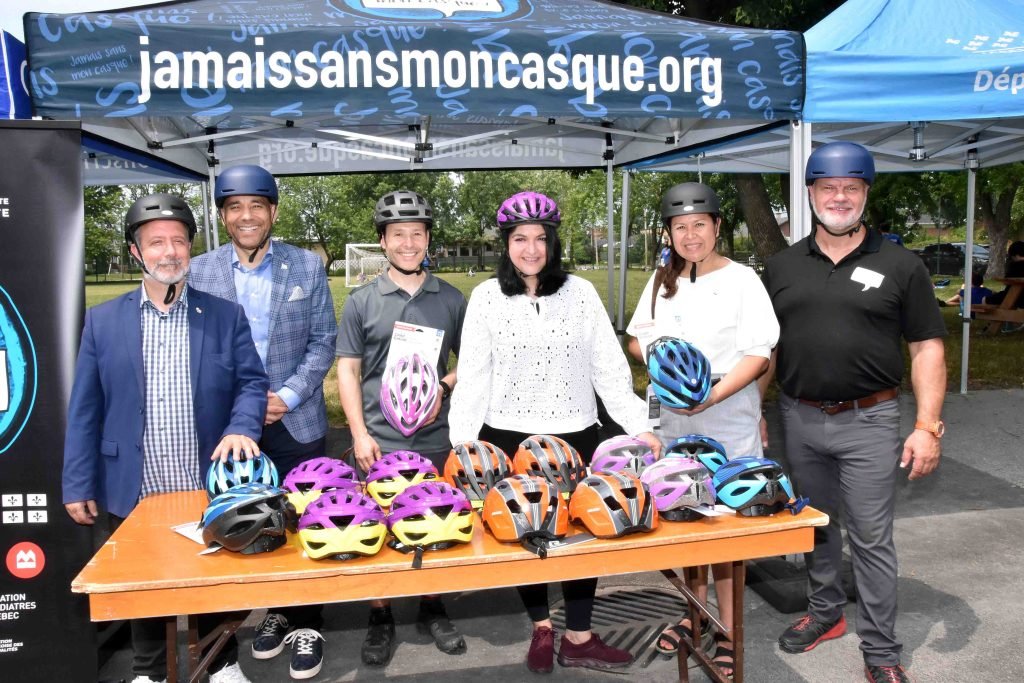As many as 40 per cent of youths 13 to 17 who fall off bikes aren’t wearing a helmet
Two local members of the Quebec National Assembly, two Laval city councillors and an eminent neurosurgeon met at a Laval-area park last week to throw their support behind a province-wide campaign to encourage all children and adults to wear protective helmets to safeguard against the devastating effects of head injuries.

Year-around head protection
Founded by Simon Poulin, he and his team are currently on a tour of the province promoting the Quebec City-based organization’s Jamais sans mon Casque’s (Never Without my Helmet) campaign to encourage the wearing of protective headgear by skateboarders and bike riders during the summer months, as well as skiers and snowboarders during the winter.
Parc du Bon Pasteur in Laval-des-Rapides was one of his latest stops last week.
According to statistics on preventing head traumas compiled from 2016 to 2019 by the Canadian Hospitals Injury Reporting and Prevention Program (CHIRPP), 41 per cent of youths from 13 to 17 years old who fell from a bicycle weren’t wearing a helmet.

Preventing brain trauma
The number rises to 61 per cent for accidents involving skateboards. According to a report by the Institut national de santé publique du Québec (INSPQ), more than a quarter of patients who were hospitalized for a head injury linked to bicycling in Quebec from 2007 to 2015 suffered a brain trauma (25.9 per cent).
As part of the promotional tour through 17 regions of Quebec, Jamais Sans Mon Casque is giving away 23,000 bike helmets to children from needy families. Over the last few years, the organization has handed out 39,450 bike helmets, while also visiting more than 2,394 schools and reaching out to 328,000 students.
Prevention key, says neurosurgeon
“Although we are proud of the cutting-edge care that our entire team is able to offer to patients who have suffered a head injury, the best defence remains prevention,” said Dr. Mathieu Laroche, a neurosurgeon at Hôpital du Sacré-Coeur in Cartierville. He is one of several people who agreed to serve as ambassadors for the cause.
“What would please us most would be to never have you as a patient,” he added. “Protecting your head ought to be a priority for everyone.”
“It is a pleasure for me to be able to serve as an ambassador for Jamais sans mon Casque in the Laval region,” said Sainte-Rose MNA Christopher Skeete. “As much as the protection afforded by a helmet is already known, far too many head injuries continue to take place by not using one. Together, we must encourage everyone, but mostly our youths, to protect their noggin.”
Wearing a helmet saves lives

“I am delighted that the Jamais sans ma Casque tour decided to make a stop in the riding of Laval-des-Rapides in order to hand out free protective helmets,” said Laval-des-Rapides MNA Céline Haytayan. “The organization thus hopes to raise awareness among the population – but mostly among youths – regarding the prevention of head traumas during sports and recreational activities. We can’t say it often enough: wearing a helmet saves lives.”
Laval city councillor for l’Abord-à-Plouffe Vasilios Karidogiannis, who is responsible for city council dossiers involving active mobility, noted that he has always encouraged the children in his family to wear a helmet when out biking or engaging in a risky sports activity – and he sets an example by wearing one himself.
City of Laval’s support
“For several years, we have been making greater efforts to facilitate active mobility in Laval,” he said. “With more kilometres of bike paths than ever and a new network of skateparks and pumptracks on the way, it was only natural that I should lend my voice to Jamais sans mon Casque in order to emphasize the importance of protecting one’s self adequately.
“The dangers are real and can impact anybody,” he continued. “To youths, parents and grandparents, I make this pledge: Take care of yourselves and wear a helmet. For our part, I can assure you that we are pursuing the improvement of our various infrastructures. Together for improved security in Laval.”
About concussion in sport
Concussions are a common type of injury. Unintentional injuries are a leading cause of death, hospitalization, and disability among Canadians… and of these, concussions are among the most common.
Concussion Treatment: Rest for 24-48 hours, followed by a gradual, medically supervised return to activity.
Many youth experience concussions during sports and recreation activities, sometimes with tragic outcomes.
Approximately 46,000 diagnosed concussions in 2016-17 by hospital emergency departments for children and youth 5-19 years of age.
Males: approximately 26,000 from sports and recreation (54%), assaults/self-harm, and other unintentional causes.
Females: approximately 20,000 from sports and recreation (45%), assaults/self-harm, and other unintentional causes.
Ice hockey, rugby and ringette are the sports with the highest proportion of brain injuries among children and youth 5-19 years of age, ranging from 27% to 44% of all injuries that happened while playing these sports.
What do Canadians know about concussions?
- 1 in 2 Canadians have little or no knowledge about concussion
- 1 in 4 do not know how concussion is treated
- Only 15% can correctly identify the best ways to treat concussion
- Only 4 in 10 are aware of available concussion tools or resources
There is an ongoing need to integrate any new knowledge on concussion prevention and treatment among allied health professionals, coaches, athletes, parents, and education providers:
- Knowledge or training in diagnosis of concussion
- Awareness or compliance among coaches, athletes and parents
- Education and training among providers
Source: Public Health Agency of Canada



